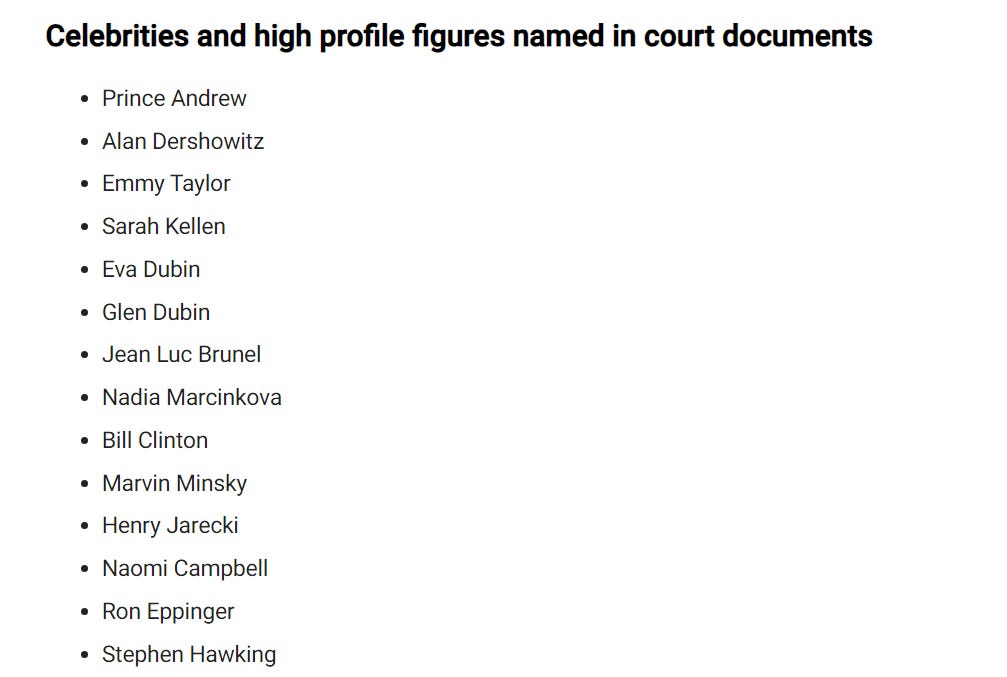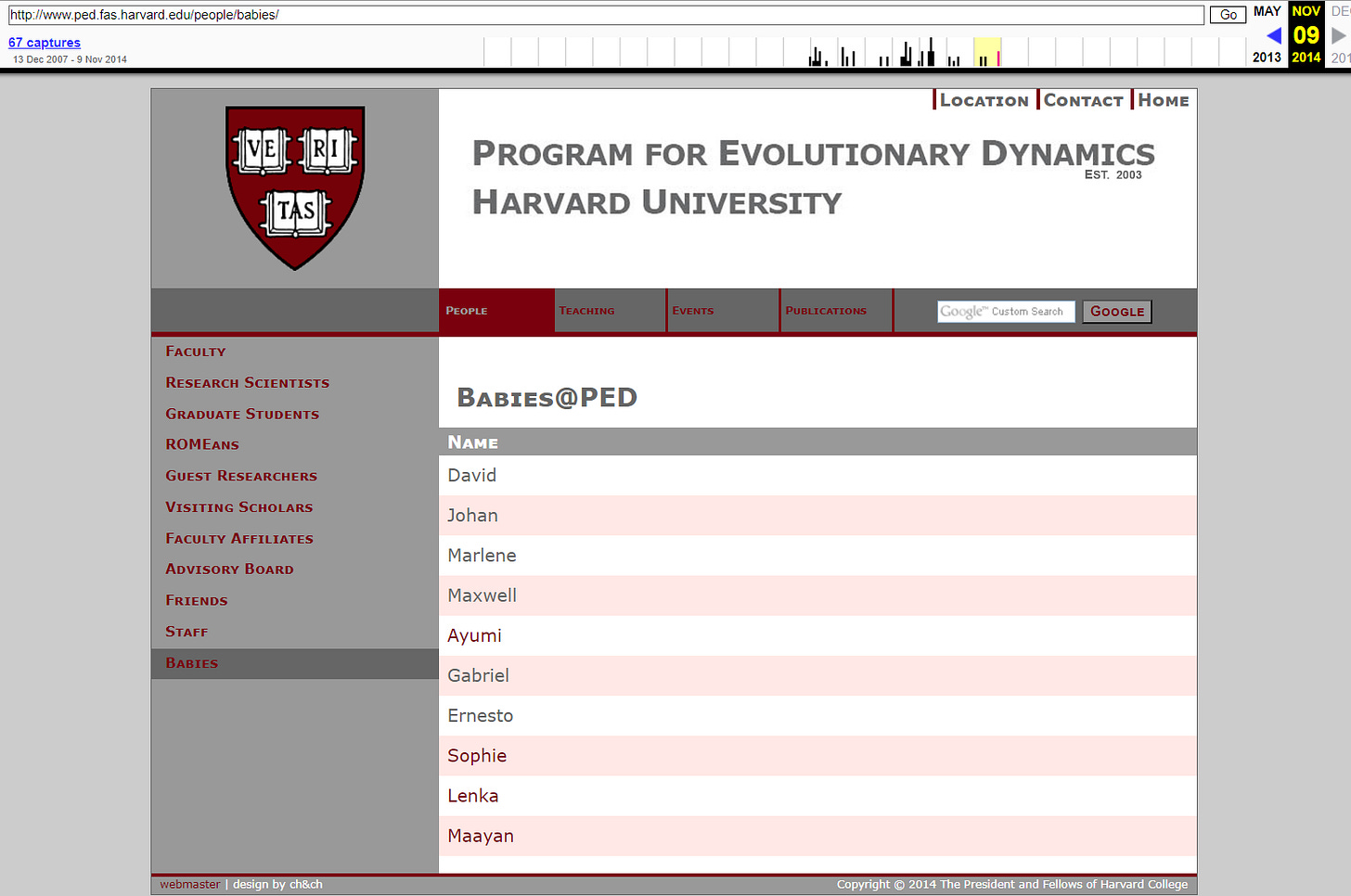Jeffrey Epstein has been associated with numerous high profile-celebrities, scientists and politicians.
According to his own website, Epstein was a Trustee of the Institute of International Education Inc. since October 2001.
http://web.archive.org/web/20140407092735/http://www.jeffreyepsteinscience.com/Founder.html
http://web.archive.org/web/20110201230812/http://instituteofinternationaleducation.com/
http://web.archive.org/web/20140209025317/http://iie.org/Who-We-Are/Governance
http://www.iie.org
https://www.iie.org/wp-content/uploads/2023/04/COVID-19-Learnings_Web-1.pdf
The deposition also names Prince Andrew of Britain and former New Mexico governor Bill Richardson, among others.
A separate witness lent credence to Giuffre’s account, testifying that she and Minsky had taken a private plane from Teterboro to Santa Fe and Palm Beach in March 2001. Epstein, Maxwell, chef Adam Perry Lang, and shipping heir Henry Jarecki were also passengers on the flight, according to the deposition. At the time of the flight, Giuffre was 17; Minsky was 73.
Minsky was one of a number of prominent scientists with ties to Jeffrey Epstein, who often called himself a “science philanthropist” and donated to research projects and academic institutions. Many of those scientists were affiliated with Harvard, including physicist Lawrence Krauss, geneticist George Church, and cognitive psychologist Steven Pinker. Minsky’s affiliation with Epstein went particularly deep, including organizing a two-day symposium on artificial intelligence at Epstein’s private island in 2002, as reported by Slate. In 2012, the Jeffrey Epstein Foundation issued a press release touting another conference organized by Minsky on the island in December 2011.
There were billionaires (Leslie Wexner and Leon Black), politicians (Bill Clinton and Bill Richardson), Nobel laureates (Murray Gell-Mann and Frank Wilczek) and even royals (Prince Andrew).
Few, though, compared in prestige and power to the world’s second-richest person, a brilliant and intensely private luminary: Bill Gates. And unlike many others, Mr. Gates started the relationship after Mr. Epstein was convicted of sex crimes.
Employees of Mr. Gates’s foundation also paid multiple visits to Mr. Epstein’s mansion. And Mr. Epstein spoke with the Bill and Melinda Gates Foundation and JPMorgan Chase about a proposed multibillion-dollar charitable fund — an arrangement that had the potential to generate enormous fees for Mr. Epstein.
Mr. Gates and the $51 billion Gates Foundation have championed the well-being of young girls. By the time Mr. Gates and Mr. Epstein first met, Mr. Epstein had served jail time for soliciting prostitution from a minor and was required to register as a sex offender.
Ms. Arnold said that “high-profile people” had introduced Mr. Gates and Mr. Epstein and that they had met multiple times to discuss philanthropy.
A Vast Charitable Fund
Around that time, the Gates Foundation and JPMorgan were teaming up to create the Global Health Investment Fund. Its goal was to provide “individual and institutional investors the opportunity to finance late-stage global health technologies that have the potential to save millions of lives in low-income countries.”
As the details of the fund were being hammered out, Mr. Staley told his JPMorgan colleagues that Mr. Epstein wanted to be brought into the discussions, according to two people familiar with the talks. Mr. Epstein was an important JPMorgan customer, holding millions of dollars in accounts at the bank and referring a procession of wealthy individuals to become clients of the company.
Mr. Epstein pitched an idea for a separate charitable fund to JPMorgan officials, including Mr. Staley, and to Mr. Gates’s adviser Mr. Nikolic. He envisioned a vast fund, seeded with the Gates Foundation’s money, that would focus on health projects around the world, according to five people involved in or briefed on the talks, including current and former Gates Foundation and JPMorgan employees. In addition to the Gates money, Mr. Epstein planned to round up donations from his wealthy friends and, hopefully, from JPMorgan’s richest clients.
Mr. Epstein thought he could personally benefit. He circulated a four-page proposal that included a suggestion that he be paid 0.3 percent of whatever money he raised, according to one person who saw the proposal. If Mr. Epstein had raised $10 billion, for example, that would have amounted to $30 million in fees.
Mr. Epstein “did propose to Bill Gates and then foundation officials ideas that he promised would unleash hundreds of billions for global health-related work.”
Mr. Epstein and Mr. Gates met for dinner and discussed the Gates Foundation and philanthropy, Ms. Arnold said.
And in October 2014, Mr. Gates donated $2 million to the Massachusetts Institute of Technology’s Media Lab.
On Saturday, a prominent figure at the Massachusetts Institute of Technology stepped down after the disclosure of his efforts to conceal his financial connections to Mr. Epstein, the disgraced financier who killed himself in a Manhattan jail cell last month while facing federal sex trafficking charges.
Almost immediately, the M.I.T. official, Joichi Ito, left the boards of three other organizations: the MacArthur Foundation, the John S. and James L. Knight Foundation, and The New York Times Company, where he had been a board member since 2012. He also left a visiting professorship at Harvard.
Mr. Ito, the tech evangelist and master networker who led the M.I.T. Media Lab — a program that prides itself on contrarian thinking — acknowledged last week that he had received $1.7 million from Mr. Epstein, including $1.2 million for his own outside investment funds.
Mr. Ito took over the Media Lab in 2011 following a rapid ascent in the tech world that made him an unorthodox choice to lead an academic program, but not the freewheeling media lab.
He was also a master networker — one who visited the Obama White House to discuss artificial intelligence
Mr. Ito’s ability to connect with both students and wealthy donors had helped him raise at least $50 million for the Media Lab, a sort of academic skunkworks. It has contributed to the development of technology related to touchscreens and GPS, is home to a program dedicated to democratizing access to outer space and hands out $250,000 awards to those “challenging the norms, rules or laws that sustain society’s injustices.”
https://media.dglab.com/2018/01/26-ryuichi-sakamoto-en-01/
Ito: I think we have to start by considering just what “human beings” are to begin with. In the United States, some people were treated as “slaves” in the past, although they were human beings. Once technological advances make it possible for computers to support the workings of the brain, there may arise discussion about whether the people using them people are human beings. If it becomes possible to connect the brains of two persons through a computer and integrate their thoughts, could the result properly be termed human thought? Companies, too, have been given the status of persons under the law, in order endow them with the same rights as human beings.
In other words, the boundary between human beings and machines is going to become increasingly blurred. As a result, ethical ideas of what entities ought to be endowed with what rights are heading for rapid change.
Ito: In a phase preceding the development of such superior artificial intelligence, there could arise, if only for a short period, a situation in which people will be used like slaves by computers. This is because a human brain may be cheaper to use than a computer. The human brain consumes about 20 watts of energy. In contrast, the energy consumed by “Watson”, the artificial intelligence system designed by IBM, reportedly amounts to about 50 megawatts. While it may take a substantial amount of energy to nurture growth of the human body, people have a lower running cost when doing calculations.
Ito: At MIT Media Lab, we are looking into collaboration between robots and human beings.
This suggests that artificial intelligence should be viewed not as something that will replace human beings, but as something to augment human capabilities.
Ito: The issue is easier to understand if we go back to ancient Greece again for an example. Slavery was an institution in Athens. Because slaves did the labor, “work” meant philosophy, education, art, and participation in society, at least as far as wealthy citizens were concerned. In essence, philosophers, scholars, artists, and educators, whose doings cannot be converted into economic terms in today’s society, were extremely important in Athens. If we replace slaves with robots, I think we can imagine the coming society. Since the Industrial Revolution, emphasis has been placed on “making things,” and the maturity of a society has been defined by the level of its manufacturing. But “making culture” was presumably always the proper role of the human brain. With the spread of artificial intelligence, we will probably see a return to this orientation.
Had I started a conversation with adults the same way, they would immediately start talking about “carbon emission levels” and the like with know-it-all looks. But junior high school students are questioning “whether human beings are needed in nature in the first place”. This struck me as a very hopeful sign for cultural creation from now on.
https://theintercept.com/2019/12/20/mit-ethical-ai-artificial-intelligence/
Many spectators are puzzled by Ito’s influential role as an ethicist of artificial intelligence. Indeed, his initiatives were crucial in establishing the discourse of “ethical AI” that is now ubiquitous in academia and in the mainstream press. In 2016, then-President Barack Obama described him as an “expert” on AI and ethics. Since 2017, Ito financed many projects through the $27 million Ethics and Governance of AI Fund, an initiative anchored by the MIT Media Lab and the Berkman Klein Center for Internet and Society at Harvard University. What was all the talk of “ethics” really about?
Inspired by whistleblower Signe Swenson and others who have spoken out, I have decided to report what I came to learn regarding Ito’s role in shaping the field of AI ethics, since this is a matter of public concern. The emergence of this field is a recent phenomenon, as past AI researchers had been largely uninterested in the study of ethics. A former Media Lab colleague recalls that Marvin Minsky, the deceased AI pioneer at MIT, used to say that “an ethicist is someone who has a problem with whatever you have in your mind.” (In recently unsealed court filings, victim Virginia Roberts Giuffre testified that Epstein directed her to have sex with Minsky.) Why, then, did AI researchers suddenly start talking about ethics?
At the Media Lab, I learned that the discourse of “ethical AI,” championed substantially by Ito, was aligned strategically with a Silicon Valley effort seeking to avoid legally enforceable restrictions of controversial technologies. A key group behind this effort, with the lab as a member, made policy recommendations in California that contradicted the conclusions of research I conducted with several lab colleagues, research that led us to oppose the use of computer algorithms in deciding whether to jail people pending trial. Ito himself would eventually complain, in private meetings with financial and tech executives, that the group’s recommendations amounted to “whitewashing” a thorny ethical issue. “They water down stuff we try to say to prevent the use of algorithms that don’t seem to work well” in detention decisions, he confided to one billionaire.
I also watched MIT help the U.S. military brush aside the moral complexities of drone warfare, hosting a superficial talk on AI and ethics by Henry Kissinger, the former secretary of state and notorious war criminal, and giving input on the U.S. Department of Defense’s “AI Ethics Principles” for warfare, which embraced “permissibly biased” algorithms and which avoided using the word “fairness” because the Pentagon believes “that fights should not be fair.”
Ito did not respond to requests for comment.
Ito was listed by TIME Magazine as a member of the "Cyber-Elite" in 1997. Ito was listed as one of the 50 "Stars of Asia" by BusinessWeek and commended by the Japanese Ministry of Posts and Telecommunications in 2000. He was selected by the World Economic Forum in 2001 as one of the "Global Leaders for Tomorrow", chosen by Newsweek as a member of the "Leaders of The Pack" in 2005, and listed by Vanity Fair as a member of "The Next Establishment" in 2007. Ito was named by Businessweek as one of the 25 Most Influential People on the Web in 2008. In 2011 he was chosen by Foreign Policy Magazine as one of the "Top 100 Global Thinkers". In 2011, he received the Lifetime Achievement Award from the Oxford Internet Institute in recognition of his role as one of the world's leading advocates of Internet freedom. In 2011 and 2012, Ito was chosen by Nikkei Business as one of the 100 most influential people for the future of Japan. Ito received the degree of Doctor of Literature, honoris causa, from The New School in 2013. On March 11, 2014, Ito was inducted into the SXSW Interactive Festival Hall of Fame. Also in 2014, Ito was awarded the Golden Plate Award by the Academy of Achievement. In 2015, Ito was awarded a Doctor of Humane Letters, honoris causa, from Tufts University and was ranked #68 on The WorldPost/GDI - Global Thought Leaders Index. In 2016, he was selected as one of the GK100: Boston's 100 Most Influential People of Color.
http://web.archive.org/web/20191012154231/https://goertzel.org/resume.pdf
RESEARCH AREAS • artificial intelligence – probabilistic logic, machine learning, evolutionary programming, cognitive science, integrative general intelligence architectures • bioinformatics, including analysis of gene and protein microarray data, and SNP and heteroplasmic mutation data, and use of databases such as the Gene Ontology and PIR and pathway databases • virtual worlds and gaming – with a focus on the use of these platforms for AI and simulated robotics • natural language processing, especially semantic analysis of texts • machine learning and data mining, especially evolutionary algorithms, also support vector machines, frequent itemset mining and other techniques • quantitative finance, especially algorithms for directional prediction of stocks, currency and commodity, futures and indices; and financial prediction based on news and other text sources • national security applications of AI, language processing and data mining
https://twitter.com/BroStreetJoy/status/1201737104386134016
https://www.newsweek.com/every-celebrity-named-jeffrey-epstein-files-1521985
http://web.archive.org/web/20141109104123/http://www.ped.fas.harvard.edu/people/affiliates





















Suspect there's going to be MUCH nastiness about Mel Gibson as it's already beginning since the Hollywood Evils know he has a Four-Part Documentary being released soon to address Child Trafficking/Rape/Murder/Luciferian Ritualistic Abuse. 'Sound of Freedom' is a Biopic about OUR Tim Ballard's work rescuing trafficked children/Sexual Slavery as a business netting $ 134 BILLION DOLLARS per year...Which when compared to the Airline Industry earning only $21 Billion per year; we are given a more accurate account of how extensive this heinous and abominable industry is.
About time the list of the Baby Farmers breeding Babies/Children to ABUSE/RAPE/MURDER as well as the Baby-Blood Drinkers/Torturers and Rapists is revealed...AS WE KNOW THERE'S LOTS MORE OUT THERE than Epstein among those delusional to believe themselves SPECIAL in their evil.
Truly sickening